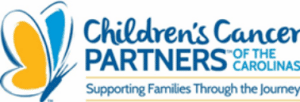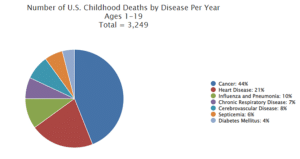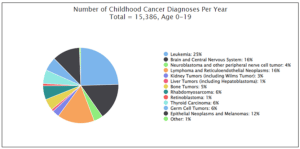News
Cancer Will Attack Over 700 Carolina Children in 2023

According to Children’s Cancer Partners of the Carolinas (CCP), the patient and family support organization that serves all of North and South Carolina, cancer will remain the #1 disease killer of Carolina children in the year ahead. Once again in 2023, over 700 Carolina children and youth ages birth to 18 will be diagnosed, joining an estimated 10,000 children and youths in the two states already in treatment, remission or survivorship.
Nationwide, 2023 diagnosis estimates range from 15,850 (CDC) to nearly 17,000 (Children’s Oncology Group). The most common types in children ages 0 – 14 are Leukemia, Brain and central nervous system tumors, Neuroblastoma and Non-Hodgkin Lymphoma. In ages 15-19, the most common are Thyroid, Hodgkin Lymphoma, Brain and central nervous system, and Non-Hodgkin Lymphoma. In both age groups, boys are 35% more often diagnosed, with similarly higher death rates.
Drawing on data from the National Cancer Institute, the Centers for Disease Control and the Children’s Oncology Group, CCP has released its annual Childhood Cancer OUTLOOK for the Carolinas, a report summarizing the impact of childhood cancer across the two states.
“We always underscore what we call the big 5 childhood cancer facts,” said CCP Executive Director Laura Allen:
- Cancer remains the #1 disease killer of children, accounting for 44% compared with 21% for heart disease and just 10% for flu and pneumonia.
- Too few places treat children – only 3 in SC, 7 in NC compared with hundreds of treatment facilities for adults.
- Children of rural or poor families face 3 times greater risk for late or missed diagnoses, under treatment, relapse or death.
- Barely 4% of all cancer research dollars are devoted to pediatric cancers.
- One in 5 children will not survive 5 years after their diagnosis; nearly one in three will not survive 20 years.
Expanding on these points, the CCP report underscores the extraordinary hardships of childhood cancer, noting that there are no effective preventive measures or detection screenings. As a result, childhood cancer diagnoses are disproportionately more late-stage than for adults. The loss of life is dramatically greater – with the average childhood cancer victim losing 71 years of life expectancy compared with 15 years for the average adult.
Due to the results of some treatments on their young bodies, 2 out of 3 childhood cancer survivors will develop at least one chronic health condition, including musculoskeletal problems and secondary cancers. Nearly 60% of childhood cancer survivors experience severe or life-threatening complications in adulthood.
Nationwide, only 201 hospitals treat childhood cancers. In the Carolinas, just 10: PRISMA Health (Greenville and Columbia SC), Medical University of South Carolina (Charleston SC), HCA Mission Health (Asheville NC), Brenner Children’s Hospital (Winston-Salem NC), Atrium/Levine Children’s Hospital and Novant Health (Charlotte NC), Duke Children’s Hospital (Durham NC), UNC Children’s Hospital (Chapel Hill NC), ECU Maynard Children’s Hospital (Greenville, NC). Since none of these facilities have all the latest treatments and technologies, as many as 1 in 5 children must be referred to national research centers in Houston, New York, Philadelphia or beyond.
Distance to treatment and family resources are powerful social determinants of survival. Studies have shown that children of rural or poor families face 3 times greater risks for: late or missed diagnosis, insufficient treatment, relapses or death. “It is not a lack of love,” noted Allen, “it is the sheer challenge of distance, and the means to get there.” In two income households, one parent leaves work for caregiving, she explained, while one income and single parent households are all too quickly in a financial crisis. Data shows that 75% of childhood cancer families suffer the loss of half or more of their income.
While immuno- and proton-therapies are showing great promise for pediatric cancer patients, any new research breakthroughs are unlikely in the year ahead, since barely 4% of cancer research is targeted at pediatric cancers. Most of the current standard treatments for pediatric cancer were approved before 1990, and half before the mid-1980’s. More funds are appropriated by Congress for male prostate cancer than for all pediatric cancers combined.
The Children’s Oncology Group, the nationwide network of all pediatric cancer centers and oncologists operates an aggressive program of clinical trials, most frequently examining new adult cancer treatments for their efficacy in children under different delivery, dosing or duration regimens.
“When one of our CCP children is referred to a clinical trial,” Allen explained, “we move swiftly to ensure access and travel support because it means our Carolina doctors have exhausted all possibilities and this is that child’s best, and all too often last chance for survival.” CCP has helped get children to specialized treatments in Los Angeles, Seattle, New York, Boston, Philadelphia, Houston, Rochester (MN), Atlanta, Jacksonville.
Depending on tumor type, survival rates range from less than 1% to over 90%. Childhood leukemia is a shining example of progress, where survival rates have risen steadily from 10% 40 years ago to 90% today.
“Whereas cancer survival is officially measured as 5 years beyond treatment,” noted Allen, “that is not especially meaningful for children whose average age at diagnosis is 6.” Data shows that as many as 1 in 3 children do not survive more than 20 years beyond their treatment.
While pediatric cancer centers refer children to CCP as a “best practice”, there can be oversights or exceptions, according to Allen, so CCP urges anyone who knows of a child battling cancer to urge them to contact CCP at 864-582-0673 or info@childrenscancerpartners.org
Allen and other members of her Children’s Cancer Partners’ team are available for interviews, or to provide additional information. They can be reached at 864-582-0673 or by contacting CCP Communications Coordinator Erica Buff erica@childrenscancerpartners.org
About Children’s Cancer Partners of the Carolinas
Children’s Cancer Partners of the Carolinas is the safety net for all of South and North Carolina, ensuring access to treatment with support for transportation, lodging, meals during travel, critical homecare, financial emergencies and funeral expenses. From offices in Spartanburg SC and Durham NC, CCP’s Family Advocates respond to pediatric cancer center referrals within 24 hours, assuring parents and caregivers of immediate, comprehensive and continuous support for their child’s cancer needs until they reach age 21. A 501(c)(3) public charity, CCP depends entirely on gifts and grants, and does not receive any government funding.


























